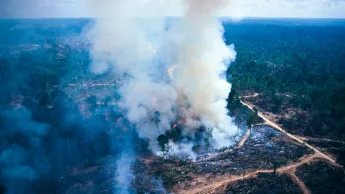Can our forests still be saved?
- 2023-05-15
- Guest contribution by alumnus Komlan Godfried Amou
- Comment

Global forest loss has assumed alarming proportions. This has massive impacts on biodiversity and our ecosystems – and thus . Dealing with this problem and coming up with effective countermeasures are therefore crucial. German alumni and forest experts from different regions of the world exchanged ideas at a organised by Alumniportal Deutschland at the end of March. Its key question: Can our forests still be saved? What are the challenges in implementing the existing activities and what solution ideas are there?
Saving forests is still possible
Forests are crucial to our ecosystems; they play a major role in preserving biodiversity and act as a carbon sink for our global climate. All participants in the discussion agreed about this. Despite the fact that large areas of forest and extensive tree populations have been lost in the last 20 years, they do nevertheless still believe that there is a possibility to counter the rapid and dramatic rate of forest loss and preserve biodiversity and our ecosystems. Olujumoke Ogunrayi, a climate expert from Nigeria, believes that ‘the preservation and funding of biodiversity is beneficial to the long-term sustainability and resilience of forest ecosystems’.
Recording of the Digital Fishbowl
The challenges in combating forest loss
Yet the participants also see numerous hurdles that stand in the way of saving our forests. These include the , which live in or in the vicinity of forests. Most people know little about the extent of forest loss and its associated impacts. They also don’t know how they can specifically contribute to forest conservation. In addition. there are political protagonists in many countries who show little commitment to conserving forests. Sociologist Pant Bhatta Poonam from Nepal also views it as difficult to raise awareness of the issue among the younger generation. But there are also positive developments. In Nepal, according to Pant Bhatta Poonam, the forest areas lost prior to 1980 have been partially restored with help from the local population.
What can realistically be done?
Environmental researcher Ahmed Siddig from Sudan stressed that the key to effectively combating forest loss depends on ‘how we are able to cooperate scientifically at an international level in solving the problem’. It is also seen as important that political protagonists and governments are committed to investing in forest conservation and to creating the required technical and legal parameters. Better communication channels need to be found to raise awareness among populations. Social media could for instance be used to reach individual target groups. Rajesh Sobhana Kumar, a forest expert from India, also believes that a greater supply of jobs in forest conservation and in combating deforestation can make a significant contribution.
Encouraging conclusion
The panel discussion revealed that involving the local population and ensuring that they are well informed can result in forests being saved and biodiversity conserved. Protection measures must however be designed for the long term, regionally and internationally coordinated, and politically funded. An (biology, agriculture, anthropology, sociology, political sciences and the like) can reinforce the effectiveness of the measures. A basic premise is that ‘quality is more important than quantity in forest conservation’, according to Mexican environmental expert Victor Avila Akerberg.
